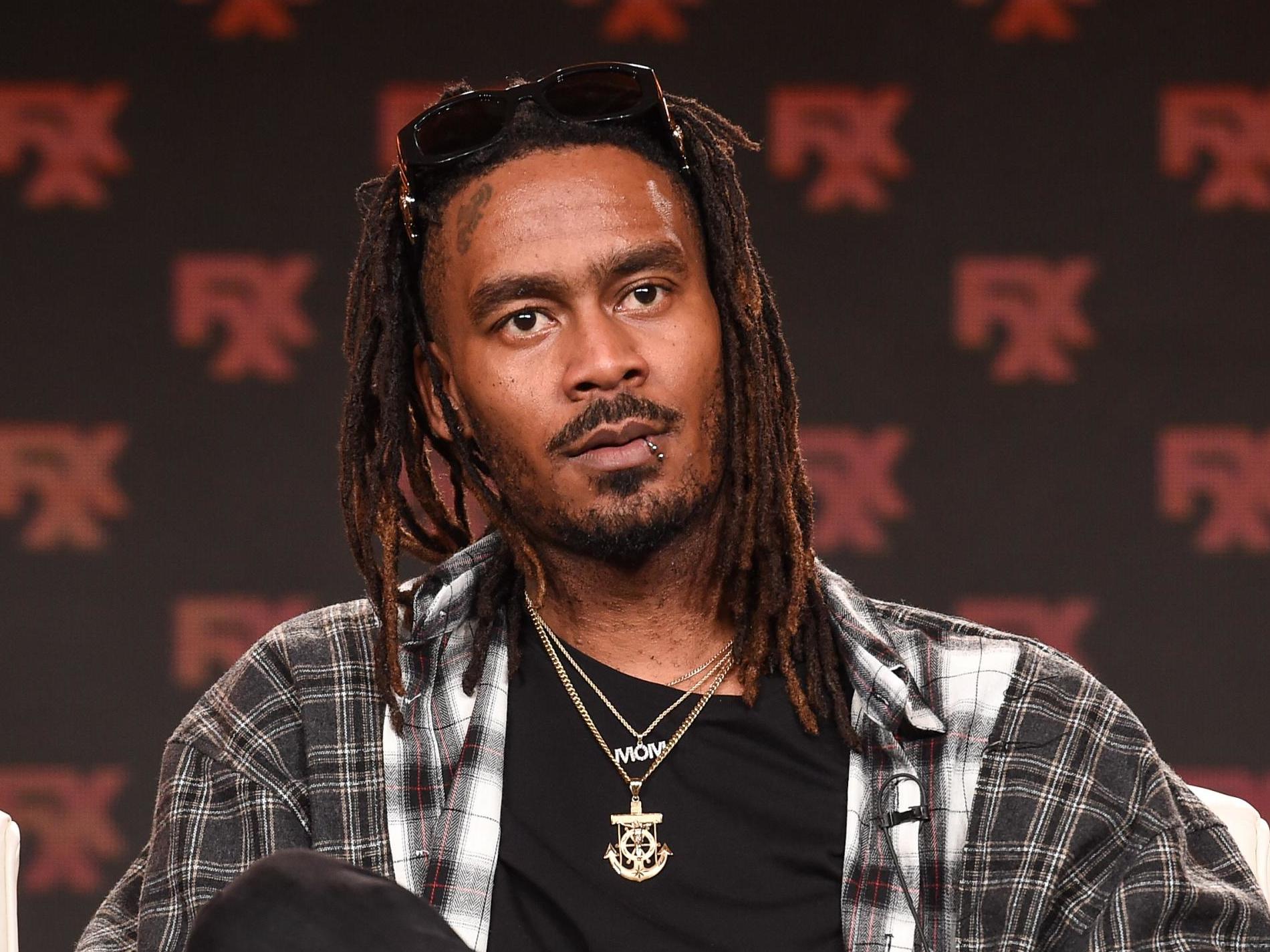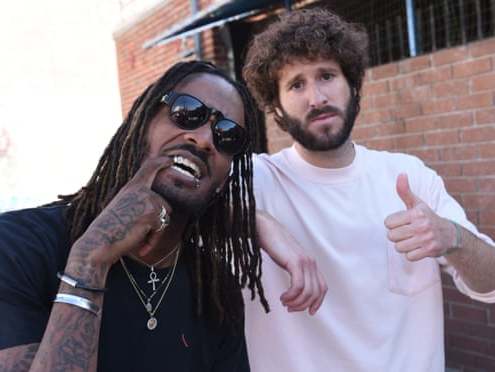Dave star GaTa: ‘I didn’t want people to know I’m bipolar – I’m from the hood’
The breakout star of Lil Dicky’s sensitive hit comedy talks to Ellie Harrison about mental health, police brutality and the appropriation of hip-hop


Your support helps us to tell the story
From reproductive rights to climate change to Big Tech, The Independent is on the ground when the story is developing. Whether it's investigating the financials of Elon Musk's pro-Trump PAC or producing our latest documentary, 'The A Word', which shines a light on the American women fighting for reproductive rights, we know how important it is to parse out the facts from the messaging.
At such a critical moment in US history, we need reporters on the ground. Your donation allows us to keep sending journalists to speak to both sides of the story.
The Independent is trusted by Americans across the entire political spectrum. And unlike many other quality news outlets, we choose not to lock Americans out of our reporting and analysis with paywalls. We believe quality journalism should be available to everyone, paid for by those who can afford it.
Your support makes all the difference.Hell no!” says GaTa, recalling his reaction when his friend Lil Dicky asked if he’d reveal his bipolar disorder in the hit sitcom Dave. “You can’t embarrass me like that. The whole world’s gonna think I’m crazy.” GaTa plays himself in the series, the hype man to Dave Burd aka Lil Dicky, real-life white Jewish rapper and viral YouTube sensation. He wasn’t sure at first if he was ready to put his innermost self on screen. “I’m a man from the hood,” he’d said. “I’m supposed to be tough.”
The FX show has been a sleeper hit in the UK – where its first season just concluded on BBC Two – and is being called the best new comedy of 2020. It’s sharp, funny and moving; crack open its carapace of dick jokes and risqué raps and you’ll find a thoughtful series tackling issues of race, mental health and masculinity, as a rapper tries to break into the music industry.
GaTa, meanwhile, gives a performance so powerful that it is already earning him early Emmy buzz. His family finally persuaded him to inspire people with his story, which led to a scene so poignant that it snatched the breath from my lungs. After so many boundary-pushing, taste-skewering jokes, the fifth episode, where GaTa breaks down in a recording studio and reveals he is bipolar, hits hard.
“Filming that scene was one of the happiest, saddest, most emotional outbursts I’ve ever had in my life,” says GaTa, 33, whose real name is Davionte Ganter. That wasn't just because it was hard to be vulnerable. “I’m from the trenches. I’m from where you can walk outside and get shot. So I couldn’t believe I was in a room with 50 white people cheering me on.”
GaTa’s tears in the scene were real. “I wasn’t faking it,” he says. “Like, f*** the script, this is it. This is someone who is bipolar and is really going through it.” It helped to have a nurse present when he was on set. “It’s crazy to say it,” he says, “but I walk around like a ticking time bomb. I try to compress my emotions and hypeness to better myself, but I’m always excited.”
GaTa’s energy fizzes through the screen as he speaks over Zoom from Koreatown, Los Angeles, a stone’s throw away from where he grew up in South Central. He was raised by his aunt and cousin, who adopted him after he lost both his parents to crack cocaine when he was 18 months old. He thinks of his aunt and cousin as his mother and sister, calling them his “guardian angels”.
GaTa had wanted to be a rapper since his teenage years. He was 17 when he met Compton artist Tyga, then 14, who he went on to work with for the best part of a decade. They collaborated with Lil Wayne and toured together, GaTa acting as Tyga’s hype man and helping him with everything from music and style ideas to naming albums.
After GaTa finished working with Tyga in 2011, he had a manic episode that led to him being diagnosed with bipolar disorder. “I f***ed up the studio, I was feeling so good,” says GaTa. “I was on Xanax and champagne. My homies rushed me home because they were worried, but when I got inside the house, I flipped out on my mom and sister. I broke my laptop. I was tripping, running around the house naked, like, ‘I’m gonna get a record deal!’
“My mom was scared so she called the sheriff, then the cops came and arrested me. They took me to the hospital, I talked s*** to them the whole way, like, ‘F*** y’all, you don’t even know who I am, I’m gonna be famous one day.’ They strapped me down and handcuffed me. I was saying, ‘Obama’s gonna come get me.’ They locked me in a padded room for 72 hours with a camera in the wall. That’s when I realised I needed help.”
The stigma around bipolar disorder and mental health in the black community breaks GaTa’s heart. “I’ve got so many black friends who don’t have the resources to get help and fix their minds,” he says. The men he knows are reluctant to get therapy because “a man always wants to look macho. It’s a man’s job to be strong. But sometimes you’ve got to put your pride to the side and just receive that help.”

GaTa was at his lowest in 2013, surviving on food stamps, when “one day out of the blue” he got a text from his former manager telling him about a white Jewish artist from the suburbs who “spits good music” but doesn’t have enough “swag”. He wanted GaTa to be Lil Dicky’s hype man. GaTa brought a fake personal assistant and photographer to their first meeting to impress him. Lil Dicky was not, as it turns out, impressed at all. “He didn’t like or believe it,” says GaTa, laughing, “but he respected my vision [of greatness]”. Eventually, the pair became “best friends”, says GaTa, hammering the emphasis on those two words.
The pals make an unlikely duo, with Lil Dicky having grown up in a leafy Pennsylvanian suburb. “He never has to get phone calls about his friends getting shot,” says GaTa. “We come from two different worlds and it’s great to put them together.”
As a result, issues such as cultural appropriation are explored with genuine insight in the show. In Dave’s final episode, The Breakfast Club radio host Charlamagne Tha God, playing himself, accuses Lil Dicky of being a culture vulture. The rapper’s response is garbled and unapologetic. “White rappers really have to be careful of what they’re doing in the hip-hop game, which belongs to the urban community,” says GaTa now. “They’ve got to respect it. But to all you white rappers out there, I love y’all. Jump in this s***, have fun, make dope music, but just know that you were inspired by black culture. People have tried to attack Lil Dicky but I’m shutting all that s*** down, he got me out the hood.”
GaTa has been on lockdown in his apartment with his French bulldog Morty. He doesn’t get out much, finding fan attention overwhelming, but he did rush down to city hall for the Black Lives Matter protests. “I felt it was my duty to go down there and hold my fist high,” he says. GaTa has witnessed police brutality countless times in his life. “Get out the car, boy,” he says, lowering his voice to impersonate a police officer. “Get on the ground, boy. Let me see your ID. Open up the trunk. Matter of fact, put your hands on the hood of this car.” He says his friends “go to jail like they’re going to church”.
The rapper feels a responsibility to speak up for his black peers now that he has a bigger platform: he is being bombarded with scripts and FX have just confirmed Dave’s second season. “I grew up in a f***ed up area,” he says. “The black community is one of the poorest races in the human race. Our environment is just so f***ed up that all we think about is f***ed up things. When you go to a white neighbourhood, it’s easy to have a good day. The sun is shining, there are dogs walking down the street, neighbours are waving at each other, people are baking cakes. It’s not like that in the black community. We’ve been on the bottom for so long, and it’s time to get to the top.
“I want every black person to be able to go out in the street and hold their head high, without anyone judging them for the colour of their skin.” He nods vigorously. “I don’t want anyone to feel like a rat in a hole. I want people to shine and feel bright and know that every day they’re above ground is a good day.”
Dave is available on BBC iPlayer now
Read the rest of our Rising Stars interviews here.
Join our commenting forum
Join thought-provoking conversations, follow other Independent readers and see their replies
Comments